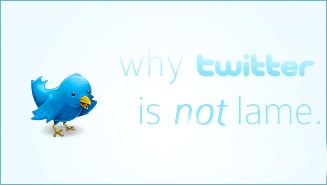 As most of you readers know, we regularly cover stuff related to Twitter over here on TechCrunch. When we do, we often get bashed by people in comments for writing about the startup and the slew of applications that make use of the Twitter API so much. Sometimes we’ll get e-mails and – ironically – messages on Twitter from people who are downright angry or disappointed in us for doing that.
As most of you readers know, we regularly cover stuff related to Twitter over here on TechCrunch. When we do, we often get bashed by people in comments for writing about the startup and the slew of applications that make use of the Twitter API so much. Sometimes we’ll get e-mails and – ironically – messages on Twitter from people who are downright angry or disappointed in us for doing that.
So we wanted to take some time to explain why that’s the case, and why you’re likely going to continue reading about them on this blog. We should note that this post was fueled by Allen Stern from Centernetworks, who published an article yesterday about why he doesn’t write about Twitter every day that hit Techmeme shortly after.
For the record: we don’t write about Twitter related news and applications every single day, just more often than most startups. Also, we’re not the only ones doing that (ReadWriteWeb, for example, had three posts related to Twitter up yesterday, four if you count the Ginx coverage too).
So why is that?
I’ll tell you why it isn’t first. It’s most definitely not because Twitter is currently the hot Silicon Valley startup with known faces running and backing it, because they raised millions in funding or because they almost got bought by Facebook for much more money than was invested in them. Heck, I work and live thousands and miles away from San Francisco and I don’t know any of the people tied to Twitter well enough to be biased because I would have a blind spot somewhere.
But I am an avid Twitter user, and I see its value and potential growing every day. We all do here at TechCrunch. We see an ecosystem of developers swarming around the Twitter API like moths around a flame, and the quality of applications that come out of that ecosystem is limited only by their creators’ imagination (well not really, but you get the point). We receive e-mails in our tips inbox and profile submissions almost daily about Twitter related tools, and most of the time we take a mental note but don’t write about them. But sometimes something resonates with us and we want to share that with you.
Why would you expect us to write about small startups getting seed funding (most recently FrugalMechanic, Diddit, Pollsb and Tvinci) but not if it’s for a Twitter desktop application (TweetDeck)? Why would you want us to cover e-commerce related startups (WujWuj) but not if it’s tied to Twitter (TwtQpon, Dell, Tweba)? Why wouldn’t Twitter co-founder Jack Dorsey joining Ustream.tv as an advisor constitute as tech news? And ask yourself: if all the talk about Twitter’s business model is so irrelevant, why does a post about its potential revenue-generating plans garner 175+ comments (and counting)? If nobody cares about Twitter, then why does a Kevin Rose guest post on how to get more followers trigger no less than 365 people to share their thoughts in comments?
If it’s the Twitter downtime posts that bother you (just yesterday, it was out for about an hour), why not just skip reading them? It’s not like the titles are misleading or anything.
Point is, Twitter has grown into far more than just a messaging or status updating service, and anyone who really uses it or develops for it knows that. It’s where news gets broken and what more and more celebrities openly turn to to start getting social with the community. It’s an almost perfect crowdsourced Q&A tool. It’s a place where companies can do business while people can choose to engage only with their peers instead. It triggers and support the organization of worldwide charity events (e.g. today’s Twestival).
Basically, it’s as social as social networking services can get.
And it’s still growing like a weed, too.
That is why we like Twitter, and why we don’t intend to stop writing about it anytime soon (and we’ll mix the positive with the negative too). You have the comment section to give your opinion, as usual, but try and keep it classy.
By the way, you can follow TechCrunch on Twitter (with the occasional update from Mike Arrington) as well as TechCrunch UK, Crunchgear and Crunchbase, and these are our individual accounts: Erick Schonfeld, Jason Kincaid, Mark Hendrickson, Leena Rao, Mike Butcher, Roi Carthy, Steve Gillmor, Serkan Toto, Henry Work, John Biggs, Greg Kumparak, Asad Akbar, Peter Ha and myself (Robin Wauters).
(Image from Darkmotion – no link because the original image contains a word that is offensive to many)
Update: our sincere apologies to all who were offended by the original image that we took from another blog, we genuinely didn’t notice that there was such an offensive word on it until 30 seconds after we published. Obviously, it still got caught by some RSS readers, so again, we’re sorry.
Update 2: apparently, the icon used in the image we embedded is from the hands of The Iconfactory)